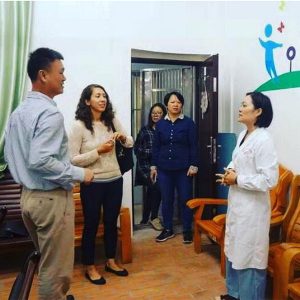Using A Standardized Patient Approach to Study Stigma Against LGBT Community in Healthcare Settings in China

Dr. Smith is most passionate about finding solutions to why so many people in the world are still dying or getting sick from preventable or curable diseases. “In the past decade and certainly in the last century, there have been a lot of amazing medical advances, yet there are people dying from things that should no longer be deadly. This is why I examine structural and systemic barriers that we need to remove in order to bring these medical advances to the groups who could benefit from them the most.”
Dr. Smith’ interest in China dates back to an early trip to China when she was ten. She went on to foster the cultural and linguistic interest in China as a history major at Yale. Following masters in international development, Dr. Smith found a job working for the HIV division of the Chinese CDC where she learned about the power dynamics and pressures that shape health policy. This experience led her into a career in global health which she pursues through work in China as well as collaborations in India, Malawi, and Vietnam.
Currently, Dr. Smith is working on a project in China with the local LGBTQ+ community. Using an approach called, “unannounced standardized patient visits,” members of the local queer community conduct incognito visits at local STD clinics to assess the quality of care for marginalized patients. The approach also allows the team to compare care quality received by patients with varying characteristics, providing a unique opportunity to measure the impact of stigma and implicit bias on patient outcomes. Dr. Smith emphasized the importance of this work saying that, “a lot of people are trying to address the problems of discrimination, stigma and racism in healthcare settings but without rigorous, objective measures, it is very challenging to know if you are making progress.”
Dr. Smith continues to pursue her passion in health equity and social justice. “The challenge of health equity and social justice is going to require all of us and each of us to do something.” Even in her new role as an Assistant Professor, she took small opportunities and learned things she would have not known otherwise. “In your current situation, without having to start any major revolution or raise a lot of money, you can still start doing things to advance the goals of health equity and social justice. There are a lot of small things we can do even today that are actually really impactful.” When asked about her advice to students, Dr. Smith said to be adventurous and not be afraid to explore widely on careers. She also recommended that students do informational interviews with people in different fields and ask them what kind of skills they wish they had before they started their job. “This can tell you about what it is that people do from day to day in their jobs and how much it aligns with what you believe their job title to be.”
